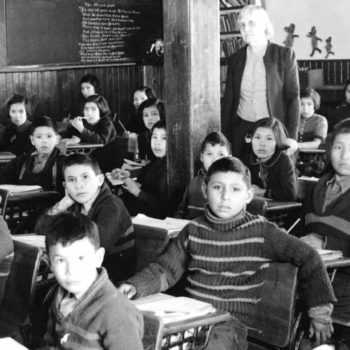Truth and Reconciliation: What is it about?
A discussion booklet for the classroom
The Canadian Teachers’ Federation (CTF) and the National Centre for Truth and Reconciliation are currently developing an education tool to help students better understand the history of residential schools and how Canadians must work collectively as part of the reconciliation process. Education is one of the key cornerstones of reconciliation.
Intended for elementary and secondary students, the classroom discussion booklet aims to support dialogue about residential schools and to explore how they hurt generations of First Nations, Métis and Inuit (FNMI) people for well over 130 years. It is the third in CTF’s series of Student Voice booklets.
The booklet will also feature the student voice in words, poems, drawings and statements from Canadian classrooms. This collection of creative student reflections and expression will also serve as a legacy piece for the National Centre for Truth and Reconciliation.
In its report, the Truth and Reconciliation Commission points out:
“Reconciliation requires that a new vision, based on a commitment to mutual respect, be developed. It also requires an understanding that the most harmful impacts of residential schools have been the loss of pride and self-respect of Aboriginal people, and the lack of respect that non-Aboriginal people have been raised to have for their Aboriginal neighbours. Reconciliation is not an Aboriginal problem; it is a Canadian one.”
The CTF hopes this initiative, among others, will help to achieve this goal by raising awareness among young people and from that point, build on the reconciliation process through understanding, dialogue and respect. The discussion booklet will be available to all Canadian teachers later in 2016 under the banner of CTF’s social justice program Imagineaction.
Over the span of six years, the TRC gathered stories of residential school survivors, thousands of documents and countless gestures of reconciliation, and organized seven national events to inform Canadians of the history and legacy of Indian residential schools. In its Final Report (Summary, PDF, 12 MB), the TRC presented recommendations to begin the long overdue reconciliation process.



